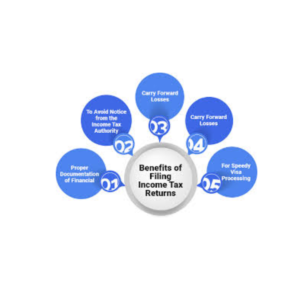

Introduction
Filing an Income Tax Return (ITR) is a crucial financial responsibility for individuals and businesses alike. Many people perceive it as a tedious task, but it offers significant benefits that go beyond mere compliance. Whether you are a salaried employee, a business owner, or a freelancer, filing your ITR can help in financial planning, securing loans, and even availing government benefits. This article explores the importance of filing ITR, its benefits, applications, and limitations.
Definition of Income Tax Return
An Income Tax Return (ITR) is a form that individuals and businesses submit to the tax authorities to report their income, deductions, exemptions, and tax liability for a financial year. The tax authorities assess these filings to determine whether the filer has paid the correct tax amount or is eligible for a refund.
User Intent: Why File an Income Tax Return?
The primary reasons why individuals file ITR include:
- Legal Obligation: If your annual income exceeds the exempted limit, you must file ITR.
- Claiming Tax Refunds: If excess tax has been deducted from your salary or investments, filing an ITR allows you to claim a refund.
- Loan and Credit Approvals: Banks and financial institutions often require ITRs for processing loans and credit card applications.
- Proof of Income: ITR acts as documented proof of income for various financial and legal purposes.
- Avoiding Penalties: Non-compliance with tax filing regulations can result in hefty penalties and legal consequences.
Benefits of Filing an Income Tax Return
1. Compliance with Legal Requirements
Filing ITR is mandatory for individuals earning above a certain threshold. It ensures compliance with tax laws and avoids penalties.
2. Claiming Tax Refunds
If you have paid more tax than your actual liability through TDS (Tax Deducted at Source) or advance tax, filing an ITR helps you claim the excess amount as a refund.
3. Ease of Loan Approvals
Financial institutions require ITR receipts to approve loans, including home loans, car loans, and business loans. A consistent tax filing history strengthens your creditworthiness.
4. Visa Applications
Many countries require tax return documents as proof of financial stability when applying for visas.
5. Carry Forward of Losses
If you have incurred business or capital losses, filing ITR allows you to carry forward these losses and adjust them against future profits.
6. Investment Proof for Financial Growth
ITR serves as a record of your financial history, which can help in investments and asset building.
7. Government Benefits and Subsidies
Individuals filing their ITRs may be eligible for various government schemes, subsidies, and benefits.
8. Avoiding Legal Repercussions
Failure to file ITR can result in penalties, legal notices, and even prosecution in extreme cases.
9. Higher Insurance Cover
Insurance companies often require ITR as proof of income when issuing high-value insurance policies.
10. Improving Financial Discipline
Filing ITR helps individuals keep track of their earnings, savings, and tax liabilities, promoting better financial planning.
Application of Income Tax Returns
- Individuals: Salaried employees, freelancers, professionals, and self-employed individuals must file ITR if their income exceeds the exemption limit.
- Businesses: All registered businesses must file ITR regardless of profit or loss.
- NRIs (Non-Resident Indians): NRIs with income generated in India are required to file ITR.
- Senior Citizens: Those earning above the exemption threshold need to file returns.
Limitations of Filing an Income Tax Return
- Time-Consuming Process: Preparing and filing ITR can be complex and time-consuming.
- Technical Knowledge Required: Understanding tax laws, deductions, and exemptions requires expertise.
- Possibility of Scrutiny: Incorrect or misrepresented filings may invite scrutiny from tax authorities.
- Penalties for Late Filing: Failure to file ITR on time results in fines and interest on unpaid taxes.
- Data Security Concerns: Online tax filing exposes personal financial data to potential cyber risks.
Cooperative Table: Filing ITR – Benefits vs. Limitations
| Aspect | Benefits | Limitations |
|---|---|---|
| Legal Compliance | Avoids penalties and legal troubles | Requires documentation and timely filing |
| Tax Refunds | Helps claim excess tax paid | Process can take time |
| Loan Approvals | Acts as income proof for banks | May require additional documents |
| Visa Applications | Required for travel to some countries | Limited scope for short-term travelers |
| Carry Forward Losses | Adjust losses against future income | Only applicable in certain cases |
| Government Benefits | Eligibility for schemes and subsidies | Requires updated filings |
| Financial Planning | Promotes better money management | Needs tax knowledge |
Conclusion
Filing an Income Tax Return is not just a legal requirement but a financially beneficial practice. From securing loans to claiming refunds and avoiding penalties, ITR filing ensures financial stability and credibility. Despite some limitations, the advantages far outweigh the disadvantages, making it essential for every eligible taxpayer to file their returns diligently.
Frequently Asked Questions (FAQs)
1. Who is required to file an Income Tax Return?
Anyone whose income exceeds the basic exemption limit prescribed by the Income Tax Act is required to file ITR.
2. What happens if I fail to file my ITR?
Failure to file ITR can lead to penalties, legal notices, and interest on unpaid taxes.
3. Can I file my ITR after the deadline?
Yes, you can file a belated return, but it may attract penalties and interest charges.
4. What documents are needed for ITR filing?
Salary slips, Form 16, bank statements, investment proofs, PAN card, and Aadhaar card are commonly required.
5. How can I check my tax refund status?
You can check the refund status on the Income Tax Departmentﻗs website after filing your return.
6. Are senior citizens required to file ITR?
Yes, if their income exceeds the exemption limit, they must file ITR.
7. Can ITR be revised if filed incorrectly?
Yes, a revised return can be filed within the prescribed time limit to correct errors.
8. Is it mandatory to file ITR if no taxable income exists?
No, but filing ITR voluntarily can help maintain financial records and avail benefits.
9. What are the penalties for late ITR filing?
Penalties range from INR 1,000 to INR 10,000, depending on the delay duration.
10. Can NRIs file ITR online?
Yes, NRIs can file ITR online if they have taxable income in India.
By understanding the benefits and process of filing ITR, individuals and businesses can make informed financial decisions while ensuring compliance with tax regulations.
For further details access our website https://vibrantfinserv.com/

For further details access our website https://vibrantfinserv.com/
To visit: https://www.mca.gov.in/
Contact:ﺡ ﺡ ﺡ ﺡ 8130555124, 8130045124
Whatsapp:ﺡ ﺡ https://wa.me/918130555124
Mail ID:ﺡ ﺡ ﺡ ﺡ ﺡ ﺡ operations@vibrantfinserv.com
Web Link:ﺡ ﺡ ﺡ https://vibrantfinserv.com
FB Link:ﺡ ﺡ ﺡ ﺡ ﺡ ﺡ https://fb.me/vibrantfinserv
Insta Link:ﺡ ﺡ https://www.instagram.com/vibrantfinserv2/